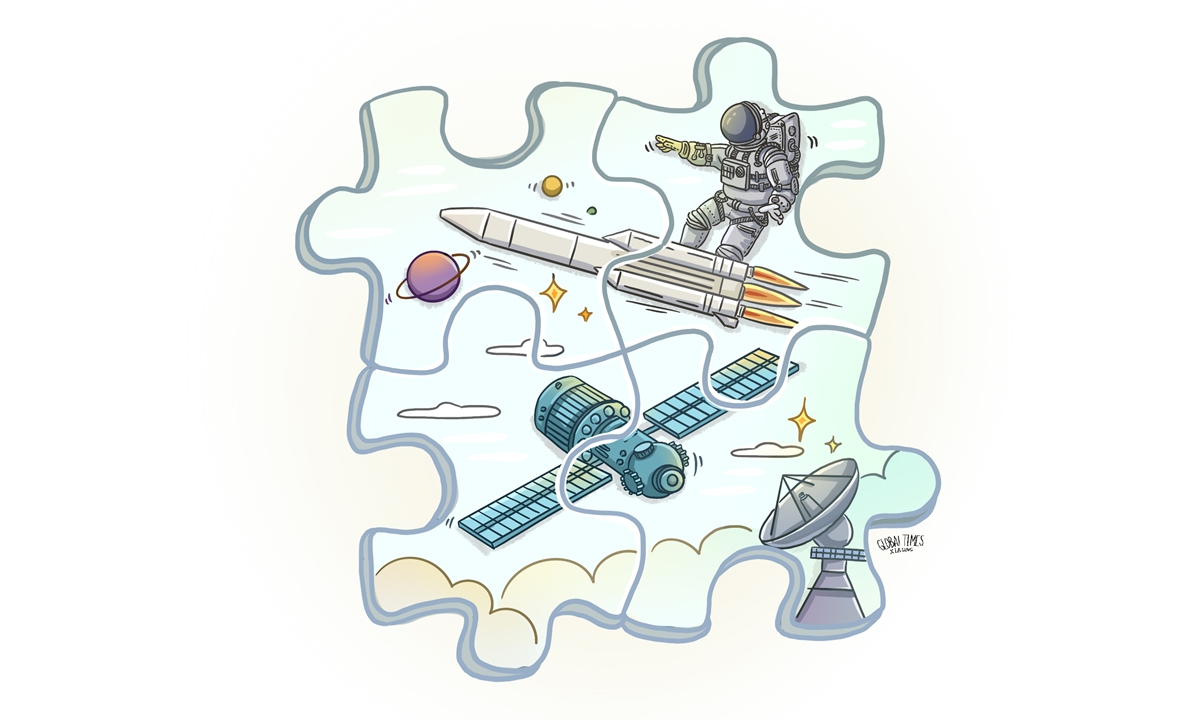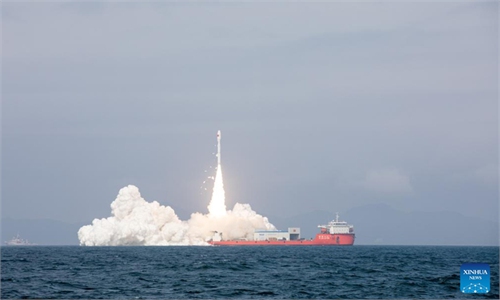
Illustration: Xia Qing/GT
SpaceX's Starship rocket launched its third test flight last week and "accomplished several major milestones and firsts," according to the US company. This latest progress of Starship, the "star" of the global rocket launch market, has gained international attention and sparked heated online discussions in China, with some arguing that "the gap between China's spaceflight and that of the US has further widened" and "the absence of a SpaceX equivalent in China is the result of systematic problems in the country's spaceflight industry."Before discussing whether the gap between China and the US in space is widening, we should take a look at a few moments in history and see how big the gap between the two countries in space technology used to be.
In 1970, China launched its first Earth satellite. A year earlier two American astronauts had landed on the moon. In 1981, when China successfully launched a set of three satellites with one carrier rocket, the US had already completed the maiden flight of the Space Shuttle a few months earlier, the world's first reusable spacecraft. In 1998, China founded the Taikonaut Corps of the People's Liberation Army with its first group of 14 astronauts. By then, 16 US astronauts had been killed during training, tests or spaceflight. That was how huge the gap between the two countries was in the past.
Today, China has the Long March-5 launch vehicle and is developing the Long March-9, while the US is testing the Starship and the Space Launch System, which is generally on par with the Chinese rocket under development in terms of capacity. Is the gap between China and the US in spaceflight bigger than that it was in 1970, 1981 and 1998?
Could China's aerospace industry progress faster by relying on commercial launches to generate more economic benefits? Overall, China's engagement in aerospace activities is cautious and restrained. If China's aerospace industry becomes a competitive force in the international space launch service market, would SpaceX be able to have an almost monopoly position? Could it generate enough profits to convince investors, and could it smoothly conduct high-investment iterative research and development?
The US can launch its aerospace industry from a leading industrial foundation, while China must develop from almost zero technological foundation under external restrictions. However, from the launch of "Dongfanghong 1," in just 50 years, China has broken free from these constraints and rapidly caught up with the world's leading levels. We have achieved what others have, and in some cases, more. When the space shuttle was popular in the 1980s, Chinese scientists such as Qian Xuesen and Wang Xiji keenly identified safety hazards associated with the space shuttle and played a crucial role in preventing us from taking a detour in this field. Whether it is manned spaceflight, deep space exploration, high-resolution observation or the BeiDou Navigation Satellite System (BDS), China has completed each phase and step with great determination.
More importantly, China never follows the beaten track but dares to be pioneers: Chang'e-4 spacecraft made the first ever soft-landing on the far side of the moon in human history; Gaofen-4 is the world's most sophisticated HD geosynchronous orbit remote sensing satellite; and the BDS has ushered in the era of two-way information sending for navigation satellites. All of these examples demonstrate the tremendous achievements of China's aerospace industry over the past few decades and the advantage of Chinese institutional mechanisms. If anyone needs to reflect, it should be the decision-making bodies of the US aerospace industry and those US politicians. Why can't the traditional US space enterprise bring down the launch costs? Why has the national policy on space, which is supposed to be above partisanship, wavered and dithered for nearly two decades?
China has always adhered to the exploration and use of outer space for peaceful purposes, and has carried out international space exchanges and cooperation on the basis of equality and mutual benefit, peaceful use, and inclusive development. For us, any progress in science and technology worldwide is a cause for celebration. In terms of aerospace development, China and the US should engage in cooperation with all countries and actively promote the building of a global community of shared future in outer space, not a zero-sum game.
The author is an aerospace researcher. opinion@globaltimes.com.cn

